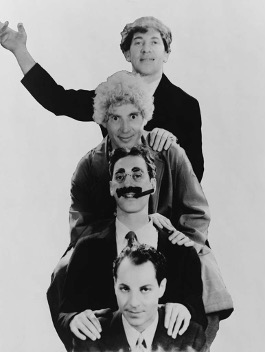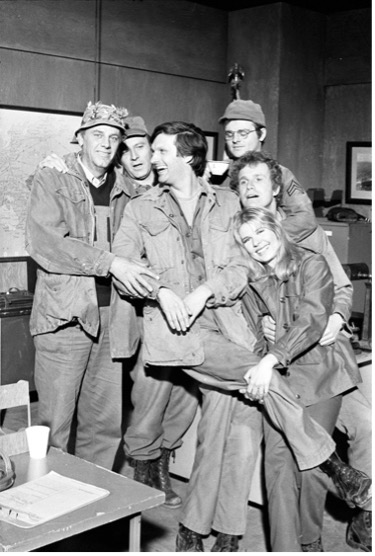MASH was an American TV show which ran from 1972 to 1983. It followed a group of doctors performing emergency surgery during the Korean War, depicting their comedic antics and, occasionally, their traumas and losses. Throughout its eleven-year run, MASH used its comedy to further anti-war messages and political agendas.
This item focuses on one episode, ‘Yankee Doodle Doctor’, and its function as a metatextual commentary on art, activism, and peace. The episode, which appears in the show’s first season, follows a US Army filmmaker attempting to make a piece of propaganda about doctors in the Korean War. After several failed attempts and some sabotaging by the show’s protagonists, he leaves the making of the film in the hands of the hospital he has chosen to depict. The resulting film is the slapstick, Marx brothers-inspired antithesis to propaganda filmmaking which in its final moments shifts abruptly from the loud and comedic to the quietly tragic.

This episode provides a fascinating case study on the power of artivism, or art with an explicit political message. Art is uniquely accessible to all populations in a way that anti-war theory and political discourse is not, and the ability to infuse art with political concepts and calls to action makes artivism a unique form of activism. MASH is acutely aware of this, and many elements of the episode draw attention to the show’s political motivations and explicit political messaging. ‘Yankee Doodle Doctor’ cycles through several genres and shows self-reflexive awareness of each. The episode begins as a standard comedy, employing wordplay and physical humour typical of the show, but shifts into a tongue-in-cheek heist story as we watch characters distract and talk circles around their targets while others steal and corrupt filmstock. The film the doctors make, shown in the second half of the episode, involves myriad references to the Marx brothers and the slapstick comedy of the 1920s and 1930s, but shifts abruptly in the final few minutes into a dramatic monologue on the costs of war and the danger of propaganda. By playing with genre, the episode draws attention to its own political messaging and anti-war agenda.
‘Gentlemen, I give you the war. Three hours ago, this man was in battle. Two hours ago, we operated on him. He’s got a 50-50 chance. We win some, we lose some. That’s what it’s all about. No promises. No guaranteed survival. No saints in surgical garb. Our willingness, our experience, our technique are not enough. Guns, bombs, anti-personnel mines have more power to take life than we have to preserve it. Not a very happy ending for a movie. But then war is no movie.’
Excerpt from the episode’s final few minutes

On its own, ‘Yankee Doodle Doctor’ and its commentary on its own anti-war stance is interesting as a piece of political media, but is not an inherently peaceful one. What elevates this episode from anti-war to pro-peace is its use of humour in providing both a pocket of peace and an urgent call to create widespread peace. MASH’s sense of humour is often what Samuel Beckett called the ‘mirthless laugh… the beholding, the saluting of the highest joke, in a word the laugh that laughs… at that which is unhappy.’[i] Put more informally by MASH’s protagonist, ‘Joking about it is the only way of opening my mouth without screaming.’[ii] Humour is an outlet and a way of healing in the midst of a traumatic situation, creating a pocket of peace and peaceful interaction in a war zone.
Its effect on the audience is more politically motivated—the humour in this episode encourages the audience to let their guard down, breaking tension and allowing us to laugh so that, when the tone shifts and the tragic subject matter is addressed, we don’t have time to put up defenses against the condemnation of war. Artivism, as it is employed here, uses its art to catch the audience while open-minded and use that vulnerability to motivate appeals for peace, not just in the fictional world the show inhabits, but in the real one as well.
It is worth mentioning that this episode does well to promote an image of negative peace, but not necessarily positive peace. In other words, it tells us what peace is not—war, propaganda, and violence—but not what myriad things peace is. My intention in including this episode in our peace museum is to highlight the effect that artivism can have on peacebuilding. ‘Yankee Doodle Doctor’ is worth studying for its ability to comment upon art, particularly film, and art’s ability to be a vehicle for political messaging. As viewers, we can take this commentary and apply its principles both to other media, from explicitly propagandic pieces like Top Gun to other artivist media like Shamsia Hassani’s art, and to peacemaking as a process, taking the pedagogical lessons we can from MASH and applying them to our lives, our passions, and our consumption of art.
What do you think?
- What effect does humour have in narrative?
- What is the relationship between comedy and tragedy?
- Where else have you seen comedy used politically?
- Can we use comedy to campaign for peace?
If you enjoyed this item in our museum…
You might also enjoy ‘Beach Party Vietnam‘, ‘Addressing Ahmadinejad‘, ‘Dad’s Army: Pockets of Peace and Humour?‘ and other items with the ‘Artivism’ tag.
If you want to see more comedy, tragedy, and peacebuilding in MASH, watch: Season 3, episode 5 “O.R.”; Season 5, episode 7 “Dear Sigmund”; Season 8, episode 22 “Dreams”
Arden Henley, April 2023
[i] Samuel Beckett, Watt. Paris: Olympia Press, 1953.
[ii] MASH season 6, episode 11. “The Grim Reaper.”